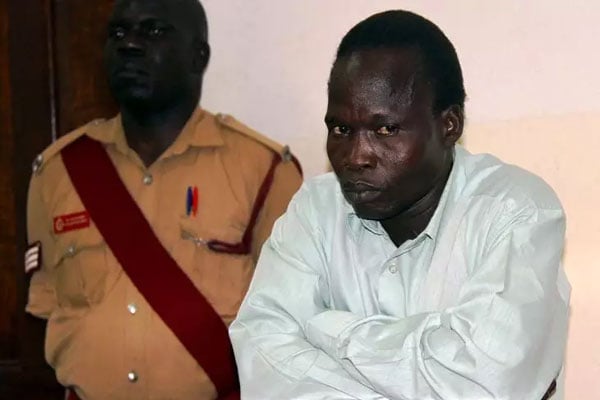
More than 14 years since he was captured in DR Congo, and close to 13 years since his trial began, the trial of former Lord’s Resistance Army (LRA) commander Thomas Kwoyelo’s is yet to conclude. If the statement ‘justice delayed is justice denied’ is to go by, then both Mr Kwoyelo and his victims have waited long for justice.
Captured in 2009 in the thickets of Garamba forests, Mr Kwoyelo, alias Latoni, was one of the top commanders of Mr Joseph Kony’s army. Mr Kwoyelo, the first LRA commander to be tried by Uganda’s International Crimes Division (ICD), holds the record of the world’s longest international crimes trial, making 15 years by September this year, if nothing is done.
Mr Kwoyelo is facing 93 charges of war crimes and crimes against humanity resulting from his role as a top LRA commander during the war in northern Uganda. Mr Kwoyelo has been in detention since the Ugandan army captured him in 2008, and his trial has progressed at a slow pace. He first appeared before the ICD in 2011. The start of his trial was delayed due to preliminary objections raised by his lawyers, who argued that he was entitled to amnesty under Uganda’s amnesty law, which was valid at the time of his capture.
More delays arose as a result of the ICD’s failure to confirm charges against him despite numerous pre-trial hearings. In 2016, three pre-trial hearings were held in April, August, and September, while in 2017, four pre-trial hearings were held in January, February, March, and July.
On August 30, 2018, the ICD finally confirmed the 93 charges against him, thereby paving the way for the main trial to open on September 24, 2018.
Mr Kwoyelo’s trial has been delayed by different court appeals, failure to show up in court by both defence and prosecution lawyers, lack of funds to facilitate court proceedings, and the Covid-19 pandemic among other factors.
The long period has complicated the protection of witnesses for both sides. Some of the witnesses and victims have since died, while the long wait has made many lose hope of receiving reparations for themselves or their departed loved ones.
Compared to his former colleague LRA commander Dominique Ongwen who was tried by ICC more or less for the same cases, Mr Kwoyelo’s case has left a glaring yearning for justice.
Ongwen was apprehended close to seven years after Mr Kwoyelo. However, his trial commenced in 2016 and was concluded on February 4, 2021, when the Trial Chamber IX found him guilty of a total of 61 crimes including crimes against humanity and war crimes. Ongwen’s case is now at the appeals stage. The key question here is why has Mr Kwoyelo’s trial progressed at a much slower pace than that of Ongwen?
Due to this delay, in March 2019, Mr Kwoyelo requested that his case be transferred to the ICC.
He cited examples of cases such as the Al-shabaab bombings of 2010 and the trial of Jamil Mukulu before the same court, all of which he claimed had progressed faster than his.
In February 2018, the African Commission on Human and Peoples’ Rights ruled that Uganda must pay Mr Kwoyelo for illegal detention and violation of rights to a fair trial. It ordered the government of Uganda to pay adequate compensation to Kwoyelo for the violation of Articles 3 and 7(1)(a) and (d) of the African Charter. The ruling was made in Banjul, Gambia. The government has, however, not complied with the ruling.
Acholi Sub-region, where the Lord’s Resistance Army committed many atrocities, has a traditional justice system known as Mato-Oput. Had Mr Kwoyelo been subjected to this justice system, the case would have been concluded long ago. Many people in northern Uganda hold the belief that the pursuit of reconciliation through traditional justice mechanisms such as Mato-Oput would have given the victims a semblance of justice served compared to the current scenario of close to 15 years of waiting.
When sworn into office in 2020, Uganda’s Chief Justice Alphonse Owiny-Dollo, a son of the soil (northern Uganda), swore to sort out the heavy backlog of cases in Uganda. In this spirit, one would have thought that a case that has lasted for more than 14 years would be of interest to him. However, nothing yet has been done to expedite the hearings.
Similarly, it would have been expected that the Minister of Justice and Constitutional Affairs, Norbert Mao, who also hails from northern Uganda and took part in pursuing peace talks with the LRA, would have taken interest in having the case concluded
For justice to be served, and to be seen to be done, Mr Kwoyelo’s case needs to come to an end for him and LRA victims.
On July 20, Principal judge Dr Flavia Nzeija at the launch of a judicial bench book on criminal adjudication of international crimes in Uganda, in Kampala, said Mr Kwoyelo’s trial had been delayed due to, among others, lack of funds.
He, however, said the Judiciary hopes to hold at least one trial of the case every quarter.
I hope this comes to pass and the case is disposed of soon.
Tonny Muwangala
A media, communications and advocacy consultant working with the Foundation for Justice and Development Initiatives, FJDI
This post was originally published on this site be sure to check out more of their content.








